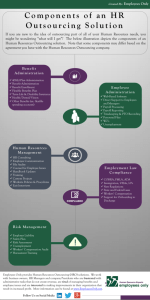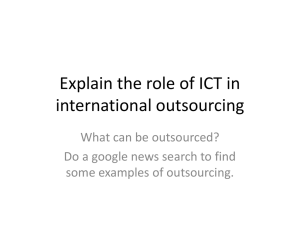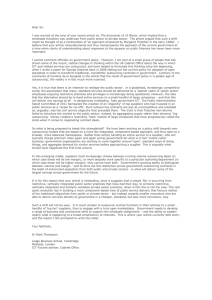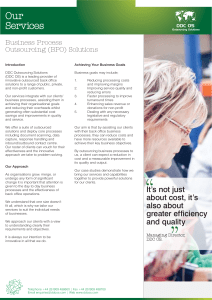PPT
advertisement
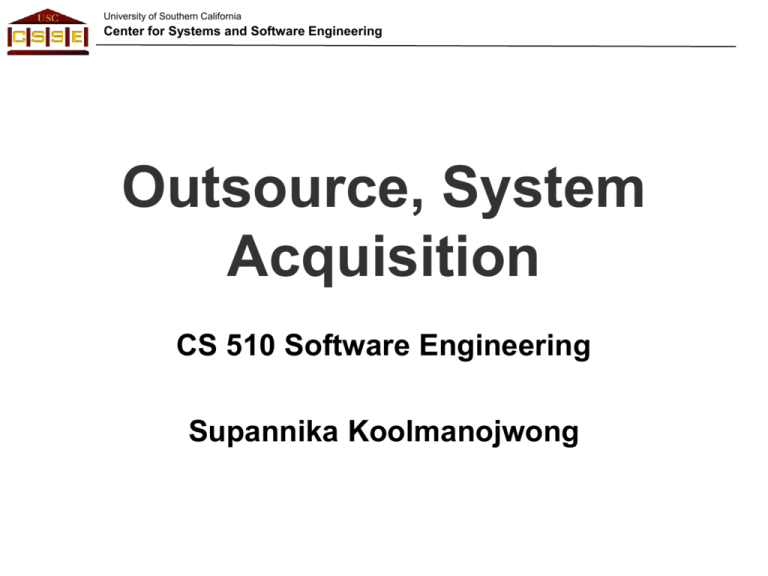
University of Southern California Center for Systems and Software Engineering Outsource, System Acquisition CS 510 Software Engineering Supannika Koolmanojwong University of Southern California Center for Systems and Software Engineering Outline • Business Process Outsourcing • IT Outsourcing • System Acquisition 2 University of Southern California Center for Systems and Software Engineering When to Outsource PricewaterhouseCoopers Model Strategic Competitive Non-Competitive Non-Strategic Not Outsourced Grey Area In House if Possible Outsource University of Southern California Center for Systems and Software Engineering Outsourcing Life Cycle www.theiia.org/ University of Southern California Center for Systems and Software Engineering Business Process Outsourcing • Contracting of the operations and responsibilities of specific business functions (or processes) to a third-party service provider. – Such as HR, finance, accounting • In 2010, the Philippines surpassed India as the largest BPO industry • Example – Customer Support Services: voice, e-mail and chat on a 24/7 and 365 days basis. – Data Entry Services / Data Processing Services – Book Keeping – Form Processing Services: Insurance claim form http://en.wikipedia.org/wiki/Business_Process_Outsourcing 5 University of Southern California Center for Systems and Software Engineering Business Process Outsourcing Opportunities for BPO Accounting Advertising Customer service Document management Finance Facilities management Human resources Information technology Internal audit Legal Logistics Manufacturing Marketing Product service Research and development Etc. 6 University of Southern California Center for Systems and Software Engineering Email Outsourcing “The total cost of ownership for an in-house email system is likely to be in the range of $200 to $400 per user per month……. Outsourcing should reduce TCO by 10% to 30%.” Ferris Research, June 2001 Typical Services • Email Hosting – – – – – – Email@yourdomain POP3 access IMAP4 access Outbound SMTP Virus Scanning External POP Access www.ou.edu/class/aschwarz/infrastr/Presentations/Outsourcing.ppt – – – – – – 24x7 Web-based Support Spell Check Email Forwarding Unlimited Attachment Size Unlimited Storage Folders Multiple attachments University of Southern California Center for Systems and Software Engineering Typical Services • Custom Webmail – – – – – – Customizable, private-label WebMail interface Wireless WAP Access Automated User Signups Integrated Ad Server Customizable to any language in the world Programming API's for front and back end system integration www.ou.edu/class/aschwarz/infrastr/Presentations/Outsourcing.ppt University of Southern California Center for Systems and Software Engineering Costs • Web Based Email Services with POP 3 access up to 6 Mailboxes Per Month •0-5,000 Mailboxes $0.99 each •5,001-7,000 $0.90 each •7,001-10,000 $0.75 each •10,001 and up $0.55 each •Minimum Monthly Fee Per Domain is $79.00 • Large Install - Setup Fee $199.00 at launch Other Options • Wireless Access - $0.30 per mailbox per month • Outgoing SMTP - $0.20 per mailbox per month purchased in blocks of 50. • Design Services - $100 flat charge for color scheme consulting. $70 per hour for custom design consulting. • Additional Storage - Units of 2mb $0.99 per mailbox per month. Acadea has customizable email solutions for schools, universities, government agencies and businesses. http://www.acadea.com/WebmailPrice.htm University of Southern California Center for Systems and Software Engineering Costs Example 4: 100 User Multi Server, Multi Location Network In-House Cost Salary For Sr Level Network Engineer $65,000.00 Salary For Software / Hardware Support Technician $40,000.00 Medical Benefits and Payroll Expense (assume 1 married 1 single) $ 18,100.00 Office Space and Expenses $ 10,000.00 Continuing Education $ 5,000.00 Hardware Repair Parts $ 10,500.00 ========= $148,100.00 Sullivan Data will provide on-sight technician during regular business hours for between $90,000.00 and $100,000.00 annually depending on equipment chosen http://www.sullivandata.com University of Southern California Center for Systems and Software Engineering http://www.kpmginstitutes.com/shared-services-outsourcing-institute/insights/2013/pdf/state-of-outsourcing-2013-exec-findings-hfs.pdf 11 University of Southern California Center for Systems and Software Engineering System Acquisition “The process of obtaining a system product or service.” ISO/IEC 2008 12 University of Southern California Center for Systems and Software Engineering Types of Contract • Product Contract – Product labels • Purchased Order – 5 copies of MS Office 2012 • Service Contract – Concerns: flexibility level, evaluation criteria, indemnities, and scope definition 13 University of Southern California Center for Systems and Software Engineering Software Development Life Cycle (SDLC) Model 14 University of Southern California Center for Systems and Software Engineering Contracting for IT and Software Projects 15 https://learn.dau.mil/CourseWare/43_4/scopage_dir/l13_contiss/l13_t4rfp.html University of Southern California Center for Systems and Software Engineering System Acquisition Cost 16 University of Southern California Center for Systems and Software Engineering Software Development Contract Styles • Fixed price, fixed scope – Risk: High risks will be on the supplier side, especially when the budget is underestimated. – Variation: • fixed-price with economic price adjustment (labor, material) • fixed-price incentive contracts (adjusting profit) • fixed-price with prospective price redetermination. (fixed for initial period) 17 University of Southern California Center for Systems and Software Engineering Software Development Contract Styles • Cost-plus or Cost reimbursement or Incentive or award-fee – suppliers can reimburse on their time and material – Risks: if buyer has a strict budget. – Variation: • cost –plus-fixed-fee • cost-plus-incentive-fee • cost-plus-award-fee (award for good performance) • cost-plus-percentage-of-cost • cost-incentives, performance incentives, and delivery incentives. 18 University of Southern California Center for Systems and Software Engineering Software Development Contract Styles • Variable time and variable costs – Major risks are handled by the client – The client needs to put extra effort on checking whether only legitimate effort and expense are invoiced – Supplier has little incentive to keep the costs down – Variation: • Variable time • Variable scope and cost ceiling • Variable time and materials with fixed scope and cost ceiling. 19 University of Southern California Center for Systems and Software Engineering Software Development Contract Styles • Evolutionary Acquisition or Phased Development or Incremental Delivery – Gets paid at the end of each increment/phase – Fund or reward of the next increment depends on the supplier’s performance 20 University of Southern California Center for Systems and Software Engineering Collaborative agreements • Vested Outsourcing – – – – Focus on outcomes, not transactions Focus on what, not how Define clear and measurable outcomes Use pricing model incentives that optimize cost/service trade-offs • Avoid fixed fee or cost-plus – Has governance structure with insight, not oversight 21 University of Southern California Center for Systems and Software Engineering Award-Fee Contracts for Evolutionary Acquisition • To increase flexibility in contracting system – Flexibility – tailor to fit your project – Responsiveness – Use technology to facilitate the acquisition process – Innovation – continuously develop and implement initiatives to streamline and improve the process – Discipline – cost, schedule, performance metrics – Streamlined and effective management 22 University of Southern California Center for Systems and Software Engineering Evolutionary Acquisition Variants and Invariants Invariants Variants Accommodates evolving requirements Degrees of flexibility employed Degrees of time phasing utilized Multiple deployments to the field supported Overlapping versus non-overlapping O&M versus RDT&E funds used Considerations in each cycle … PLUS technology insertion opportunities Choice of development process Choice of contract vehicle and type Nature of incentives used to stimulate performance Choice of risk resolution techniques Emphasis is on total life cycle The variety of tasks included in the life cycle Decision point at the end of each increment involves multiple stakeholders Choices of decision-making method employed (risk-based funding, etc.) Content of deployment is driven by risk consideration (market, operational, etc.) Trade space used for deciding what to deploy Managing stakeholder life cycle commitment is done via anchor points How teamwork issues are managed 23 University of Southern California Center for Systems and Software Engineering Seven Critical Success Factors • • • • • • • Schedule Preservation Continuous Integration support Cost Containment Technical Performance Architecture and COTS compatibility Program management Risk Management 24 University of Southern California Center for Systems and Software Engineering Rating Guide for Seven Software Critical Success Factors Criteria Score Factor I – Schedule Preservation Weight Weighted Score 0.20 Factor II – Continuous Integration Support 0.15 Factor III – Cost Containment 0.20 Factor IV – Technical Performance 0.10 Factor V – Architecture and COST compatibility 0.15 Factor VI – Program Management 0.10 Factor VII – Risk Management 0.10 TOTAL SCORE 25 University of Southern California Center for Systems and Software Engineering Typical Timelines and Award Fee Amount Evaluation Period From To First Upon Contract Award 25% of Development Schedule Available Award Fee 25% Second 25% of Development Schedule 50% of Development Schedule 25% Third 50% of Development Schedule 75% of Development Schedule 25% Fourth 75% of Development Schedule End of Award Fee period of performance 25% TOTAL 100% 26 University of Southern California Center for Systems and Software Engineering ICSM 27 University of Southern California Center for Systems and Software Engineering BPO Advantages • • • • • Productivity Improvements Cost Savings Improved HR Focus on Core Business Competency Increased Capability University of Southern California Center for Systems and Software Engineering BPO Disadvantages • Recent Studies • Knowledge Disappears and is Transferred to the Outsourcing Partner • Poor Quality Control • Restoring Operations is Complicated • Lack of Loyal Employees • Reduction in Strategic Alignment University of Southern California Center for Systems and Software Engineering 5 Managerial Steps That Pay Off 1. Go Offshore for the right reasons • Shifting a broken process overseas may not fix it 2. Choose your model carefully • Could cost more…..(I’ll fix this part) 3. Get your people on board • Employees and middle managers can make the bold move happen….or stop you in your tracks University of Southern California Center for Systems and Software Engineering 5 Managerial Steps That Pay Off 4. Be prepared to invest time and effort • Often what is lacking in offshore partners is a lot of deep process knowledge 5. Treat your partners as equals • Telling your partners exactly what to do and how to do it is not conducive to the entire process

